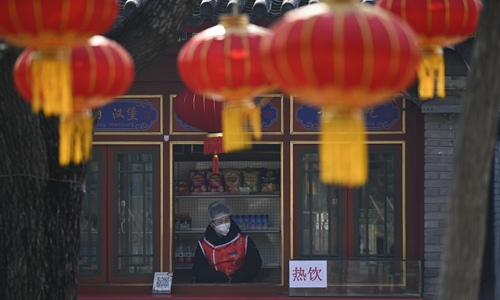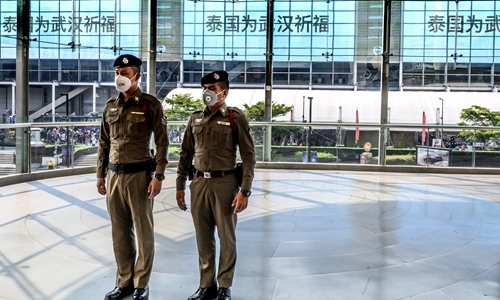
A staff member, wearing a facemask, waits for customers near the Forbidden City in Beijing on Friday. The Chinese people have just experienced an unforgettable Spring Festival as the whole country has been forced to endure the spread of the novel coronavirus.Photo: AFP
The spread of the novel coronavirus has brought an element of suffering to the 2020 Spring Festival. This has made the normally optimistic Chinese people more cautious about the future.
More than a decade ago, a survey, conducted by the Grey Group and involving 8,000 participants in 16 countries and regions, showed that 94 percent of the polled Chinese believed in a better future, far ahead of Japanese (45 percent) and Singaporeans (66 percent). I estimate that if a similar survey were conducted now, it would show Chinese people's optimism is still ahead of that of people in other countries, even though there are reasons for it not to be high.
Over the years, many unpredictable events have been amplified by the media and on the internet. It has impacted people's expectations for a positive future. Especially in recent years, many of the negative phenomena that were rarely seen in the past are occurring around the globe.
One negative phenomenon that has attracted much attention is negative interest rates. Negative interest rates have been rare in the history of economics. About 20 countries have adopted negative interest rate monetary policies in recent years. They aim to boost social consumption and corporate borrowing in the hope of boosting their economies. But for people in those countries, negative interest rates bring high uncertainty because their savings will depreciate and investments may suffer. In the short term, negative interest rates may contribute to economic growth, but over the long run they will promote excessive consumption, overly aggressive investment, and increase bank risks and the possibility of a new global financial crisis.
The second negative phenomenon is negative growth. Negative interest rates are closely related to negative growth. In recent years, economies including Italy, Turkey, Argentina and Russia have experienced several quarters of negative growth. In order to prevent the frequent emergence of negative growth, various aggressive economic and financial policies have been adopted, including negative interest rates. But another cause of negative growth is hard to rectify: population. In most European countries and Japan, there is a labor shortage; the population is in decline; economic policies are weak, and expectations for development and growth are gloomy.
The third negative phenomenon is the negative role that the US has been playing. Unlike at the end of WWII when the US led the world out of recession, the US is now playing a negative role in international development. Its withdrawal from various international treaties has undermined the international order that was established after WWII. Partisan disputes in the US have brought unprecedented challenges to its democratic system. Trade wars launched by the US have dealt a huge blow to the world economy. The negative effect of a hegemonic power is a reality that needs to be reinterpreted in international political theory.
The fourth is "negative energy". Traditionally, young people represent a country's vitality, innovative thought and upward force. Throughout the 20th century they promoted the unprecedented prosperity brought by economic globalization, trade liberalization and scientific and technological breakthroughs. Nowadays, many young people around the world have become decadent and confused complainers. In 2019, in some developed regions, including Hong Kong and France, many young people have taken to the streets and resorted to violence that has led to social disorder and chaos.
Compared to the above negative situations occurring in many parts of the world, the coronavirus epidemic in China is only a temporary shock. During the Spring Festival holidays, many officials, medical staff, construction workers, and media personnel have given up their vacation to combat the virus.
A 1,000-bed hospital has been built in just 10 days. Donations have exceeded tens of billions of yuan. More than 1 billion Chinese people have fully cooperated with the government. There have been no riots or disorder, which shows the strong power of positive attitudes in China. From this perspective, China remains the country with the most positive and least negative attitudes in the world.
However, Chinese people may need to undergo a psychological transformation and upgrade: Cruel international competition, the deterioration of the global environment, the lack of impetus for global economic growth, and the pressures of the next generation will make China's sustainable development and national rejuvenation more difficult. Fortunately, Chinese policymakers have been well aware of the difficulties ahead.
The rise of nations is a never-ending endurance race. From this perspective, negative impacts, such as the coronavirus outbreak, are likely to occur frequently in China's future development. But as long as they are handled properly, there is nothing to fear.
The author is professor and executive dean of Chongyang Institute for Financial Studies at Renmin University of China and executive director of China-US People-to-People Exchange Research Center. wangwen2013@ruc.edu.cn




